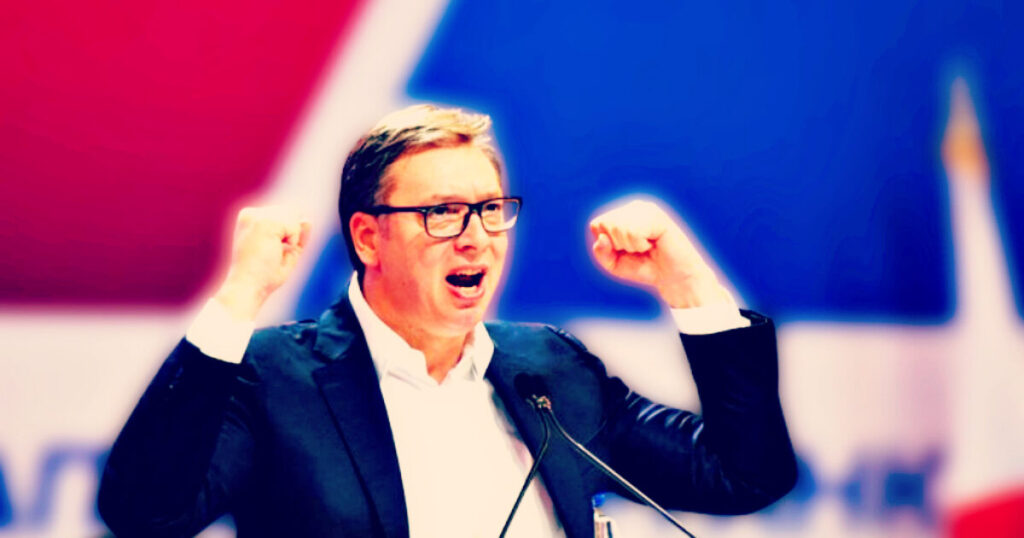In the current European landscape, political neutrality, especially regarding the West’s stance against Russia, has become increasingly perilous for leaders such as Serbia’s Aleksandar Vučić. Politicians like Hungary’s Viktor Orbán and Slovakia’s Robert Fico find themselves under immense scrutiny and pressure, enduring harsh criticisms and heightened risks, evidenced by Fico’s recent near-fatal shooting incident. Both leaders exemplify the challenges faced by those who resist aligning fully with the European Union’s directives. As protests erupt in Serbia, motivated by various domestic crises, including a tragic rail station disaster that claimed 15 lives, Vučić confronts mounting calls for his resignation amidst allegations of corruption and mismanagement.
Vučić’s situation mirrors that of his counterparts, with opposition figures drawing unfounded comparisons between him and Syrian dictator Bashar al-Assad. Such comparisons, according to Vučić, are devoid of merit. He has publicly pledged not to abandon his post under pressure, emphasizing his commitment to Serbia and rejecting any foreign interference. Through social media platforms, he has declared, “I will fight for Serbia and serve only my Serbian people and all other citizens of Serbia.” This rhetoric highlights his stance against globalization, a fundamental element of the current political tension in Serbia and broader Eastern Europe.
The protests that erupted in Serbia not only spotlight domestic discontent but also weave into a larger narrative that Vučić claims is orchestrated by foreign entities. He attributes various protest movements to “Western sources,” alleging that external powers are employing “hybrid tactics” to destabilize his government. Such accusations resonate with certain populist rhetoric prevalent in the region, portraying internal dissent as a product of foreign manipulation rather than domestic grievances. This aligns well with historical sentiments in Serbia about foreign influences, especially given the country’s complex relationships with both Western and Eastern powers.
Underlying these protests is a stark division in Serbian society, which grapples with its geopolitical identity—caught between aspirations for European Union membership and enduring alliances with Russia and China. Vučić’s administration maintains a politically neutral stance, particularly regarding sanctions against Moscow following the invasion of Ukraine. This position has made him a target for discontent from both pro-Western protesters and hardline nationalists who push for a more definitive orientation either towards the EU or Russia. The balancing act Vučić attempts is indicative of the broader tensions within Serbia concerning national identity and global affiliations.
Anticipating the possibility of further unrest, Vučić has promised to unveil what he describes as a systematic campaign to undermine Serbian sovereignty, asserting that external interests aim to transform Serbia into a “vassal state.” His determination to confront these alleged threats and contend with the internal dissatisfaction reveals the high stakes involved in maintaining his leadership amidst increasing pressures. Vučić has indicated his commitment to providing evidence of foreign funding aimed at destabilizing his administration, framing the discourse in a way that seeks to rally national sentiment against perceived external adversaries.
In conclusion, the situation in Serbia encapsulates the broader European political struggles between populist leadership and external pressures from the EU and major powers like the United States. Vučić’s refusal to conform to Western expectations while claiming to serve national interests resonates with constituents who feel a deep connection to Serbia’s sovereignty. As the protests gain momentum, the outcome will likely hinge on Vučić’s ability to navigate both public dissatisfaction and external political fragmentation while crafting a narrative that reinforces his government’s legitimacy. The resolution of these conflicts will not only affect Serbia’s political future but also shape its role in the complex web of European geopolitics, signifying a critical juncture for the nation.

